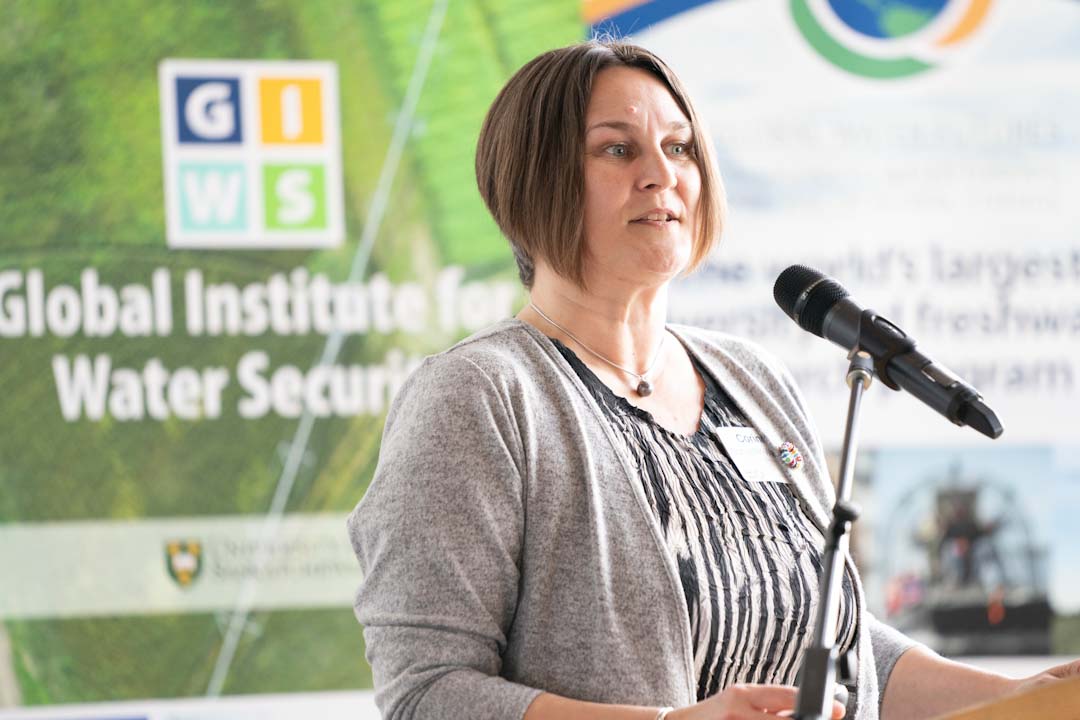
USask-led Global Water Futures announces 12 new projects to advance water security across Canada
SASKATOON – After four years of transformative research, the University of Saskatchewan (USask)–led Global Water Futures (GWF) program—the world’s largest university-led freshwater research program —is launching the second phase of its seven-year mission with a $2.5-million investment in 12 new critically important water security projects.
By Mark Ferguson, and USask Research Profile and ImpactThe new projects—which include research into climate projections, water-borne diseases, and metal release in thawing permafrost environments—are led by investigators from USask and its partners McMaster University, Wilfrid Laurier University, McGill University, and the University of Waterloo, as well as the University of Quebec at Montreal.
“With GWF, we’ve broken down borders and silos to work together across Canada,” said USask researcher and GWF Associate Director Corinne Schuster-Wallace. “It’s very inspiring and I know that we can make a difference for all Canadians and others around the world.”
Schuster-Wallace’s project, co-led by McMaster researcher Sarah Dickson-Anderson, aims to tackle the growing problem of groundwater quality in wells used as a drinking source for people and livestock.
“We want to better understand the environment, hydrology, and contaminant processes and risks to humans and livestock associated with private well water security,” said Schuster-Wallace. “Private wells are used extensively across Canada to provide both people and livestock with water to drink. However, in most jurisdictions, these wells are the responsibility of the well user and lack of awareness of this can pose risks to health.”
Established in 2016 with an initial investment of $77.8 million through the federal Canada First Research Excellence Fund (CFREF), GWF is currently investigating the water problems of almost 450 partners, collaborators, and users. The program funds 190 professors from 18 Canadian universities, which have hired close to 900 students and research personnel to help solve these problems.
“When we started Global Water Futures, our user community told us there were some massive issues that we needed to address, such as developing improved flood and drought prediction systems, diagnosing the changes our freshwater is undergoing as a result of rapid climate change, and managing water-related risks such lack of clean water, especially in Indigenous communities,” said GWF Director John Pomeroy, Canada Research Chair in Water Resources and Climate Change at USask.
“We were confident we could develop new knowledge and predictive models, but we felt the long-term solutions for many of these problems would require a revised national water strategy that addresses the increasing risks to water from climate change,” said Pomeroy. “We are now starting to see our ideas come to fruition, such as next generation water prediction and observing systems, as well as the announcement of the Canada Water Agency in the recent Throne Speech.”
Pomeroy said there is a lot more research that needs to be done, pointing to problems of diminished groundwater quality, declining lake ice, more frequent toxic algae in lakes, thawing permafrost, damaging floods, inequitable impacts of water insecurity, and the lack of empowerment of Indigenous communities to manage their own source waters.
GWF has allocated more than $69 million to its 64 projects and core support teams. Over the past few months, GWF has renewed and funded 11 projects that have been operating since 2017 and has launched six Indigenous community water research projects. There are also seven affiliated projects based as far afield as New Zealand that receive in-kind support from GWF, and strong partnerships with the U.K., China, India, Spain, and the U.S.
GWF has global partners that include Future Earth, the World Meteorological Organisation, UNESCO, the World Climate Research Programme, and the United Nations Water Action Decade. GWF continues to lead national conversations on how a Canada Water Agency could help mitigate risks and provide water solutions across the country.
For a list of all GWF projects and teams, visit: www.globalwaterfutures.ca
-30-
About Global Water Futures:
Global Water Futures is a seven-year, University of Saskatchewan-led research program established within the Global Institute for Water Security in 2016 and funded in part by a $77.8-million grant from the Canada First Research Excellence Fund. The research goal is to transform the way communities, governments and industries in Canada and other cold regions of the world prepare for and manage increasing water-related threats.
GWF is the world's largest and most cited university-led freshwater research program. The program is developed and funded in part by four key partners—USask, the University of Waterloo, McMaster University, and Wilfrid Laurier University—and includes hundreds of faculty, researchers and support staff, hundreds of partners, and 18 Canadian universities.
For more information, contact:
Mark Ferguson
Global Institute for Water Security
USask
306-966-7135
m.ferguson@usask.ca
Victoria Dinh
USask Media Relations
306-966-5487
victoria.dinh@usask.ca

